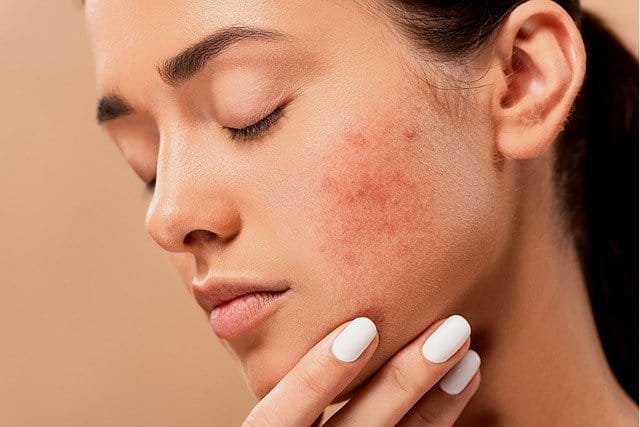
Dr. Teo Wan Lin is the host of a beauty podcast- Dermatologist Talks: Science of Beauty, which covers the latest in skincare active ingredients, dermatology news and beauty technology. Listen to her podcast here.
In this Conscious Beauty blog series which ties in with the launch of my podcast- Dermatologist Talks: Science of Beauty, I will be sharing about sensitive skincare tips in common dermatological conditions.
This article will focus on a sensitive skin dermatologist’s view on skin reactivity and sensitivity, tips on managing skin sensitivity, as well as how to know if you have eczema.
Reactive skin is characterized by marked sensitivity to physical (heat, cold, wind) or chemical (topically applied products) stimuli and by the impairment of the skin barrier’s ability to repair itself
A sensitive skincare routine is critical in the treatment of sensitive skin and eczema. I shall share about the types of moisturisers you should look out for and the active ingredients helpful in treating dermatitis.
What is dermatitis? Symptoms, Signs and Diagnosis
Dermatitis is equivalent to eczema. There are various subtypes of dermatitis that we see in dermatology.
The typical type of eczema that we see affecting children and adults is known as atopic dermatitis. This is a genetically inherited tendency to develop dry skin and sensitivity. It is due to a genetic defect that results in a filaggrin mutation. This produces deficient or insufficient amounts of the fatty lipid ceramide, which functions to moisturize the skin’s outer layer. Another type of dermatitis is known as seborrheic dermatitis. The term seborrhea refers to oil production.
To break it down, seborrheic dermatitis really refers to oily skin that is sensitive and is inflamed. So having both symptoms of dry and oily skin can be suggestive of the disease. Seborrheic dermatitis characteristically affects the eyebrow areas, around your nose (nasolabial) around the mouth. Individuals who suffer from mild to moderate separate dermatitis may find that they have increased flaking on the scalp. Symptoms of dandruff, scalp sensitivity, oiliness- especially if they don’t wash their hair daily is suggestive of seborrheic dermatitis. In severe cases, they may develop a condition known as sebopsoriasis, where they have larger areas or red flaky patches on the scalp.
Another type of dermatitis known to dermatologists is known as perioral dermatitis. Perioral dermatitis is a condition that results in acne-like bumps, known as papules around the mouth area, hence the term perioral. It is associated with flaking dryness and red patches. It is sometimes misdiagnosed as hormonal acne. An accredited sensitive skin dermatologist can accurately diagnose if you have hormonal acne or perioral dermatitis, or sometimes, both.

Risk Factors for Sensitive Skin
The risk factors for developing sensitive skin or eczema is as follows. If you have a personal history of allergic rhinitis, sinusitis, asthma, hay fever, then you’re at a higher risk of developing skin sensitivity or eczema. If anybody in your family has any of these conditions, you’re also considered at higher risk.
What is the difference between sensitive skin and reactive skin?
Both terms sensitive and reactive skin are not used as scientific terms in dermatology. Rather, they have been coined to describe a pattern of skin behavior that laypersons can easily understand. For the purposes of this article, sensitive skin is best understood as synonymous with individuals with atopy- or tendency to develop allergies and eczema. This is directly related to barrier dysfunction of the skin. On the other hand, reactive skin refers to individuals whose skin symptoms develop in reaction to external triggers.
Reactive skin can be understood as sensitivity to external stimuli. External triggers can be in the form of physical changes, such as temperature or pressure on the skin. It can be due to skincare or what is described as contactants. Reactive skin reacts to these triggers in the environment. This leads to inflammation in skin. Importantly, human beings are not meant to live in a controlled “bubble” and healthy skin can tolerate these changes.
When one develops sensitive skin, the impaired skin barrier function causes a skin reactivity because these allergens penetrate the skin. This triggers the immune system.
The underlying cause of reactive skin can be due to multiple different dermatological diagnosis. Sensitive skin individuals generally have reactive skin, while only aminority of individuals with “reactive skin” actually do not have sensitive skin.
Specifically, individuals with conditions such as rosacea qualify as having reactive skin, as heat and sunlight triggers the condition. If you suffer from rosacea, you may not have concomitant dry sensitive skin. However, there are patients who have both rosacea (a type of reactive skin condition) and eczema. In this case, both conditions have to be treated for the skin to look normal.
Another type of reactive skin condition in dermatology is a condition known as hives. Hives on the skin is also known as urticaria. Cholinergic urticaria is a type of heat rash that is triggered by raised temperatures. Aquagenic urticaria develops as skin rashes after contact with water. If you get rashes after having air conditioning blown directly at you, you may have a form of physical urticaria. Developing rashes over where elastic waistbands and straps are is also a form of dermographism, or pressure urticaria.
If you have urticaria and eczema together, you have both reactive and sensitive dry skin symptoms. However, you can also have hives and still have a normal skin barrier, which means your skin doesn’t feel dry. If you have both, treating the skin barrier with a “PED” moisturiser, such as the Multi-Ceram cream I formulated under Dr.TWL Dermaceuticals. It stands for “Prescription Emollient Device” which means it contains an optimal lipid (fat) ratio that balances the skin repair mechanism. It also has a steroid-like anti-inflammatory effect which helps reduce the dependence on steroid creams long term for eczema.
Reactive skin conditions such as rosacea leads to skin inflammation that result in skin thickening. This is cosmetically disfiguring, causing enlarged pores and uneven skin texture.
Treatment of Sensitive Skin, Reactive Skin and Eczema
Sensitive Skincare Tip #1: Understand the skin barrier -protection matters
My first of the 4 sensitive skincare tips, is that if you have sensitive or reactive skin is to understand the concept of the skin barrier. In my previous article I spoke about the skin barrier- best visualized as a wall that protects the internal environment from the external environment. External triggers like pollutants, dust, pet fur present to the body’s immune system as allergens. These are common triggers for eczema.
The skin barrier also degenerates with ageing and environmental exposures. If you are constantly doing wet work i.e. housework or working in an occupation which involves wet work. This increases your risk of eczema.
Frequent contact with water, being in a damp environment increases trans-epidermal water loss. Trans-epidermal water loss due to evaporation from the skin surface can deplete the moisture levels of the skin. This makes it prone to skin irritation.
Remember to wear appropriate protective gloves when in performing wet work. No matter how resilient your natural skin barrier is, it will suffer damage with accumulated exposure. If you are not wearing protective gloves, even detergents made for sensitive skin will still strip the skin barrier of moisture.
Sensitive Skin Dermatologist on How to prevent hand eczema
This is the way to wear your protective gear, a set of long gloves, preferably latex free. Individuals who have skin sensitivity may also have concomitant latex allergy. Wear long gloves that reach up to your elbows for complete hand protection. As a sensitive skincare tip, I recommend my patients to double glove. This means a set of cotton gloves on the inside, and the set of longer gloves on outside. This will reduce your exposure to the chemical detergents.
Lathering agents i.e laureth sulfates weaken the skin barrier. When you are mopping the floor, with bleach or disinfectant, your feet comes into contact. Over time, this results in irritant contact dermatitis when the skin’s barrier function is damaged. High contact areas such as the hands and feet are often the first areas to develop skin sensitivity in individuals who do not have a genetic tendency to develop eczema so if you have developed this, then it’s possible that you actually acquired it true the exposure, with these substances.
Performing housework without protective gloves or boots exposure to detergents household cleanser cleaning agents can increase your risk of developing eczema. In this context, there are two main types of dermatitis. Acquired dermatitis can be in the form of allergic or irritant contact dermatitis. The other is atopic dermatitis, as discussed earlier. The difference between allergic and irritant contact dermatitis would be in the mechanism of reaction that occurs to cause skin hypersensitivity.
If you are chronically exposed to harsh cleaning agents, you’re likely going to develop a form of irritant contact dermatitis. The strong chemicals in these cleansing agents, meant to dissolve tough stains- will break down the skin barrier over time. In addition, if you have atopy, certain ingredients such as fragrances, or preservatives may trigger an allergic reaction.
Sensitive Skincare Tip #2: Opt for surgical steel jewelry
Individuals who have metal allergies i.e. to costume jewelry, actually have a form of nickel hypersensitivity, and this itself is more prevalent in individuals who have atopic dermatitis. It is important to note that most people develop nickel sensitivity in the later part of their life. This is due to exposure to costume jewelry that causes sensitisation.
The allergic reaction does not arise immediately. It usually occurs after several exposures to the substance, causing the immune system to remember the allergen. Surgical steel jewelry is distinct from stainless steel jewelry (304) as it is labelled 316L with medical implant grade steel that is virtually free of environmental nickel contamination.
Sensitive Skincare Tip #3 Get your sensitive/reactive skin condition properly diagnosed by an accredited dermatologist
Reactive skin cannot just be treated with moisturizers as the underlying condition is medical in nature as opposed to just dry skin causing barrier dysfunction. For urticaria or hives, an effective oral anti-histamine regimen, coupled with avoidance of triggers is required.
Diagnosis must be made by an accredited dermatologist. You can check your doctor’s accreditation here. Aesthetic doctors are general practitioners and not considered skin specialists. Mistaking rosacea for eczema or sensitive skin will worsen the condition. Eczema treatment is usually with anti-inflammatory topical steroids. Steroid treatment used for eczema will cause worsening of rosacea. There is a special type of rosacea known as steroid-induced rosacea- causing skin thinning, prominent blood vessels, raised bumps (acne rosacea) and further flushing symptoms.
Furthermore, it is critical to understand the underlying biological processes that cause reactive and sensitive skin. Sensitive skin is mainly due to loss of normal skin barrier function. Reactive skin is not strictly used as a medical term, although it is best interpreted by laypersons as skin that easily reacts to external changes i.e. environment. Skin sensitivity and reactivity are common skin symptoms for facial eczema and rosacea.
Sensitive Skincare Tip #4 Manage Emotions and Mental Stress
Managing your psychological state is very important. Reducing mental and emotional stress will prevent stress hormones that are released into your blood circulation. These stress hormones trigger inflammation and directly cause flare-ups of dermatological conditions such as acne, rosacea, eczema, psoriasis and even hair loss. Research shows consistently that psychological stress in laboratory mice worsens existing skin and hair diseases. It is also a risk factor for the development of new dermatological conditions.
One of the key indicators of stress is the emotion of being overwhelmed, feeling that one is unable to cope with the situation. Stress is subjective because what causes stress in an individual may not cause any stress in another. This has to do with mental resilience. Resilience cannot be acquired overnight or easily taught- as it has to be practised. Mental and emotional resilience is a character trait acquired through real-life experience in various difficult situations.
Resilience can only be acquired in adversity- by conditioning your mind and emotions to respond in a positive manner in relation to the stressful situation.
Brain training is another important way to harness this ability to overcome psychological stresses. The practice of mindfulness is a method that is evidence-based in cognitive behavioral science. A mindful attitude embraces the following: focusing on the moment, having a non-judgmental attitude, cultivating a “beginner” mindset. This helps the individual reduce perceived stress. Mindfulness activities include meditation, or activities that requires focus- engaging in craft or doing sports. My patients with long term skin conditions such as eczema, rosacea and even acne experience flare ups, whenever they feel stressed. Therefore, long term stress coping strategies form a critical part of medical treatment.
“Your healing journey towards beauty, begins with your consciousness of the inner world,” Dr. Teo Wan Lin.
Conscious Beauty

Conscious Beauty by Dr.TWL Dermaceuticals stars model-actress Sara Malakul Lane, international burlesque performer Sukki Singapora and dermatologist at TWL Specialist Skin & Laser Centre Dr. Teo Wan Lin. Feminine beauty as a modern tale told by the girls themselves, through the lens of fashion model-turned photographer Sabrina Sikora.
E-book version only. 100% of proceeds received from CONSCIOUS BEAUTY will go to charitable causes supported by Dr.TWL Dermaceuticals – Action for AIDS Singapore and the United Nations World Food Programme. Available on Amazon Kindle, and the Dr. TWL Dermaceuticals website.
Dr. Teo Wan Lin is an accredited dermatologist practising at TWL Specialist Skin & Laser Centre. An expert in dermocosmetics for skin diseases, the skin microbiome and biofunctional textiles, her work has been published in top dermatology journals. Her additional research interest is in the brain-skin connection which emphasises psychological wellbeing in sufferers of chronic skin disorders. In her journey of helping dermatology patients for over a decade in practice, she strongly believes that true beauty has to begin from the inside rather than from the external.
